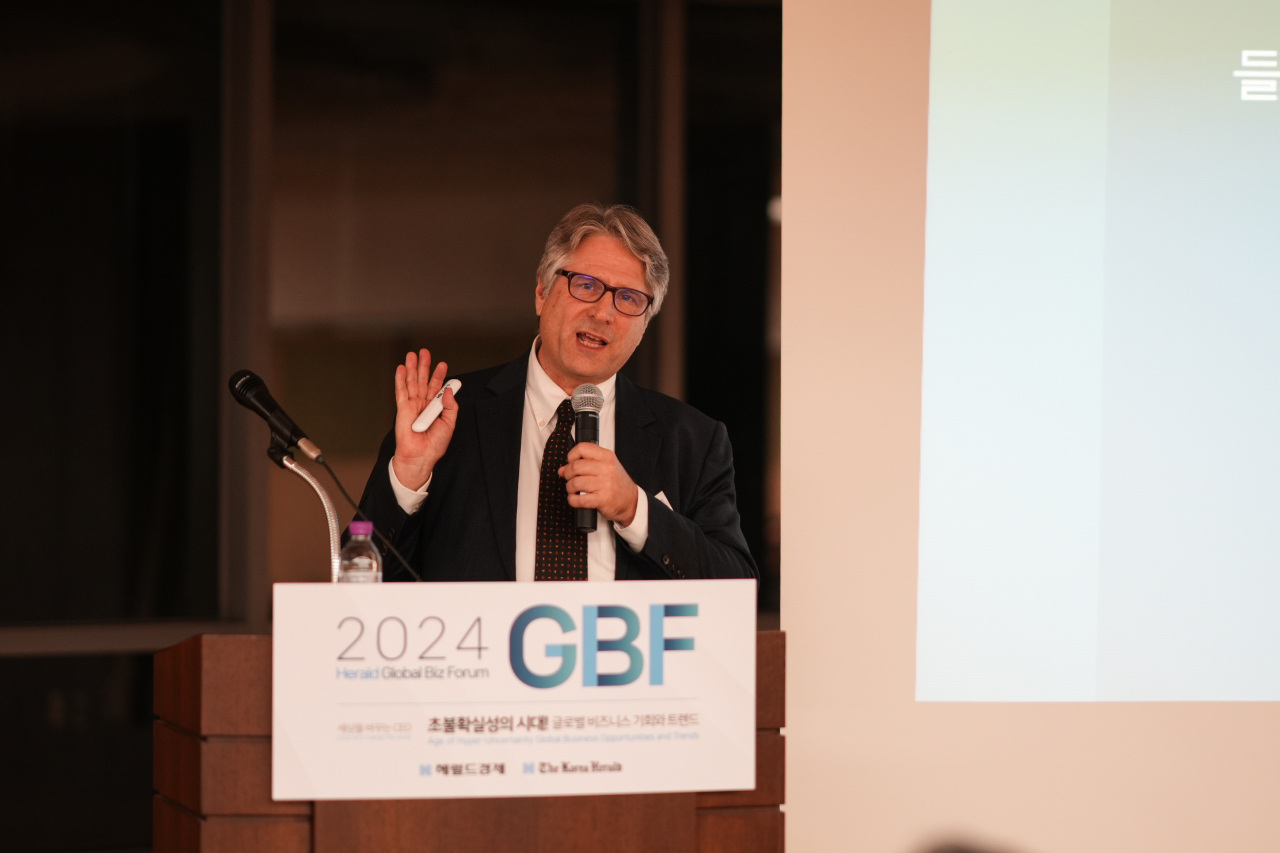 |
Professor Ross King of the University of British Columbia in Canada speeches on Wednesday at the GBF in Uiwang, Gyeonggi Province. (Damda Studio) |
South Korea needs a strategy to maintain the growth of the Korean language, according to Ross King, a professor of Korean language and literature at the University of British Columbia.
The Korean language has gained popularity in North America in recent years, but a lack of strategy could jeopardize its future, King said.
The number of students studying the Korean language has grown by about 75 percent in the US over the past 10 years, while student enrollment in other language courses has dropped since 2009.
King, who teaches Korean linguistics, is one of the founders of Sup Sogui Hosu, a Korean language village in Concordia Language Village in Minnesota, which opened in July.
“Korean media only reports good news, like how many students enrolled in a Korean course at university. But they don't see a way forward if they keep studying Korean,” King said, referring to students' lack of academic and professional prospects after studying advanced Korean.
“The number of beginners has quite increased, but when it comes to the number of students majoring in Korean, it’s not,” he added.
One of the biggest problems preventing Korean language’s development in North America is the lack of funding.
“Japan gave $1 million gifts to 10 different American universities in 1972 and kept doing that for about 20 years. So, $1 million in 1972 is nearly $7 million now. Today does the Korea Foundation ever give $7 million to anybody?” he asked rhetorically.
“Some say students in countries like the United States don’t need help. But that’s not true. What students have is debt,” King said, explaining the high cost of university tuition in the US, adding that it is not reasonable for students to expect to come to Korea to pursue Korean studies.
Even though some people want to donate to develop Korean studies overseas, thornier issues wait for the donations.
“So far, nearly the only way to donate is through the Korea Foundation, but even that is really difficult. Simone’s CEO Park Eun-kwan made a $5 million donation in 2018 and it took him almost one year to make it,” he said, criticizing the red tape involved in making such a donation. Simone is a Korean accessory and handbag maker.
Another major roadblock for students preventing the advancement of Korean studies is the lack of professional opportunities, according to King.
“In the case of Japanese studies, you have tons of scholarships, research institutes and professorships with names like all Japanese company names all over the place. But most of the (lecturer) positions for teaching students Korean language are not permanent, leading to fewer students who major in Korean linguistics,” King said.
“This is a huge opportunity loss for Korea. These are people who could become bridge builders, and become long-term cultural and public diplomacy assets,” he stressed.
The professor emphasized that it is high time to invest in Korean studies in North America, as the “Korean Wave” is sweeping the world and motivating many people to learn the Korean language.
“As Japan did for more than 20 years from the 1970s, if Korea takes this opportunity and does the long-term investment (of fostering Korean Studies in North America), I believe that Korea can enjoy the fruit in decades,” said King.
“But it is the Korean government, the public and businesses that should do the investment,” he emphasized.







![[Herald Interview] How Gopizza got big in India](http://res.heraldm.com/phpwas/restmb_idxmake.php?idx=644&simg=/content/image/2024/11/20/20241120050057_0.jpg)